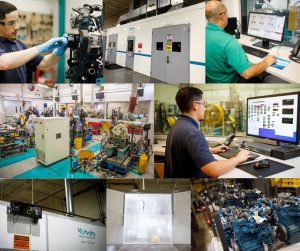
Kubota engines power a wide range of applications, from generators to industrial machinery. Ensuring their reliability and performance is crucial. This is where the dedicated team of technicians in the Dyno Lab steps in. We’ll take a closer look at the responsibilities of the Dyno Lab staff and how they ensure the quality and reliability of Kubota engines through precision testing.
Engine/Machine Testing
The Dyno Lab team boasts versatile testing capability, covering diesel, gasoline, LPG, natural gas and hybrid engines. They excel in instrumentation and data acquisition, allowing them to monitor every aspect of an engine’s performance. Moreover, they leverage their testing expertise to program custom automated test profiles tailored to specific requirements. The team possesses the capability to create CAD drawings and fabricate parts and fixtures for testing; improving testing timelines by performing this task in house.
Sample Engine Preparation
Before testing begins, the Dyno Lab team meticulously prepares sample engines. They change parts to match specifications, equip the engine for testing and install it on the dynamometer (dyno). After installation, they break in the engine. Then adjust performance to specification and carry out controlled performance testing ensuring accuracy and repeatability. Once testing is complete, the engine is removed from the dyno and prepared for shipping, ready to be integrated into its intended application.
Durability Testing
Durability is a key concern for Kubota engines. The Dyno Lab staff conducts extensive durability testing. This includes pretest teardown inspections, and measurements. Engines are instrumented and subjected to rigorous testing, including extended runs lasting from 100 to 3,000 hours, with weekly checks and oil sampling sent out for evaluation. After testing, engines undergo post-test inspections to assess the effects of testing on performance and engine longevity.
Cold Chamber Testing
To ensure engine performance in extreme conditions, the Dyno Lab team operates a cold chamber capable of testing engines at temperatures ranging from -10°C to -40°C. This ensures engines can withstand the harshest environments they may encounter in real-world applications.
Safety First
Safety is a top priority for the Dyno Lab staff. Technicians are OSHA trained and certified in first aid, CPR, and AED use. They actively participate in safety committees and emergency response teams. Regular equipment inspections are conducted to ensure proper operation and mitigate safety risks.
Additional Responsibilities
The Dyno Lab team also contributes to various aspects of engine testing, development, and support. They fabricate parts for research and development, evaluate engine support system components and kits. They support service and application engineering departments providing a wealth of hands on and diagnostic experience. They play a critical role making sure the lab is prepared to accomplish all requested testing through planning and executing of complex capital projects, as well as component sourcing and compatibility with existing test equipment.
Continuous Improvement
The team’s commitment to excellence extends to process improvements and standardization for Kubota. They work to enhance processes, ensure quality and efficiency, and provide continuous training to improve team member skills without compromising testing schedules.
The Dyno Lab staff at Kubota plays a vital role in the testing and development of Kubota engines. Their dedication to precision testing, safety and continuous improvement ensures these engines meet the highest standards of performance and reliability. Their work is not only essential for product development and customer satisfaction, but also for providing valuable support to engineering and sales teams. Ultimately contributing to the success of Kubota in the industrial engine industry.
